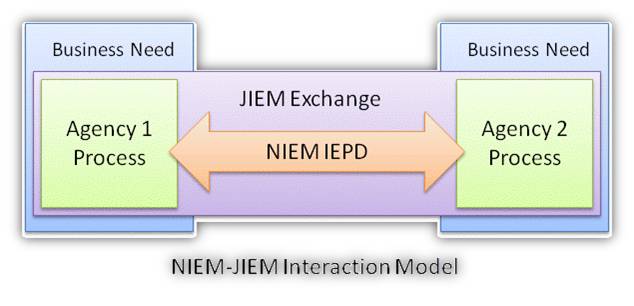28.06.2009
data sharing, Information sharing, JIEM, law enforcement, Law enforcement information sharing, LEIS, N-DEx, NIEM, Processes, Strategy
Remember the old Reese’s Peanut Butter Cups commercial? “You got chocolate on my peanut butter “…”No, you got peanut butter on my chocolate “…? Well, this is one of these stories…
It’s no secret, the National Information Exchange Model (NIEM) is a huge success. Not only has it been embraced horizontally and vertically for law enforcement information sharing at all levels of government, but it is now spreading internationally. A check of the it.ojp.gov website lists more than 150 justice-related Information Exchange Package Documentation (IEPD) based on NIEM–it’s been adopted by N-DEX, ISE-SAR, NCIC, IJIS PMIX, NCSC, OLLEISN, and many other CAD and RMS projects.
For at least the last four years, Search.org has been maintaining the Justice Information Exchange Model (JIEM) developed by Search.org. JIEM documents more than 15,000 justice information exchanges across 9 justice processes, 75 justice events, that affect 27 different justice agencies.
So if JIEM establishes the required information exchanges required in the conduct of justice system business activities, and NIEM defines the syntactic and semantic model for the data elements within those justice information exchanges…then…
Wouldn’t it make sense for JIEM exchanges to call-out specific NIEM IEPDs?
And vice-versa, wouldn’t it make sense for NIEM IEPDs to identify the specific JIEM exchanges they correspond to?
Here’s a diagram that illustrates this…

Let me know what you think..
r/Chuck
chuck@nowheretohide.org – www.nowheretohide.org
06.10.2008
data sharing, Information sharing, Strategy
Today, the Office of the Director of National Intelligence (ODNI) released a new federal policy [document] that aims to increase terrorism related information sharing among members of the Intelligence Community (IC). The policy “directs agencies to work with their human resources departments to add items about information-sharing skills and behaviors to performance appraisals.”
The release of this policy effectively means that the sixteen politically appointed IC agency heads, all of their deputies, the hundreds of senior executive department heads, and thousands of mid-level division managers failed in their efforts to get their folks to share. I guess the thinking is that adding a sentence of two to the performance appraisal of each of the 200,000+ individuals in those agencies will make information sharing happen–wow, what a sad commentary to the failure of leadership in these agencies.
To me, information sharing is a “means to an end” and NOT an end in itself. Before you can say that you do not have sufficient information sharing, you should be able to say (specifically) what the impact of not having that information is to your mission activities. The diagram below illustrates a Knowledge Model (similar to one that I picked up during my work at NSA).

As you can see from the diagram–information leads to knowledge of “something”, and that something causes (or requires) specifc action, and the specifc action leads to “real-world-effects” (like the prevention or disruption of terrorism or other criminal activity). Some examples of impact statements include:
– “We are unable to ascertain the threats to water supplies in the city of xxx…”
– “We cannot determine the whereabouts of bad guy xxx…”
– “We do not understand the objectives of the xxx threat group…”
If you follow my logic so far, then you also have come to the conclusion that the lack of information sharing is really a management issue, driven by internal agency data sharing and security policies and should not be left to the purview of individuals within those agencies. Here are a couple other points to ponder in support of this thought:
1. I believe information sharing should primarily be implemented through technological mechanisms; take it out of the hands of agency individuals and political culture.
2. it should also be driven by MISSION needs and NOT just for the sake of sharing; many analysts will tell you we share TOO much irrelevant information and NOT ENOUGH of the stuff they really need.
3. No single individual in any agency should have the ability to withold information from another agency; if this is the case, there’s a manager somewhere who requires some alignment.
4. If individuals do hold back information, they do so against the will of their leadership (assumingly); most agency employees are loyal and will follow (to a fault sometimes) their manager’s will.
Comments and thoughts welcomed…r/Chuck

